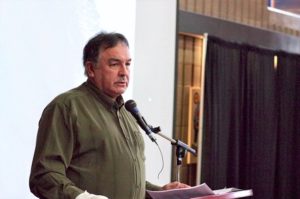Fort William First Nation speaks about community efforts to revitalize Anishinaabemowin

By Rick Garrick
THUNDER BAY—Fort William Chief Peter Collins called for more Indigenous language teachings during Lakehead University’s Jan. 15 opening ceremony of its year-long celebration of the United Nations International Year of Indigenous Languages.
“If you’re not talking [Anishinaabemowin] on a regular basis, it is not an easy language to pick up,” Collins says. “So we need to have more teachings, more young people connecting with each other talking about their language and talking in their language.”
Collins says the youth in his community are starting to learn Anishinaabemowin.
“We have Kindergarten for the first time in our community and we are trying to inject that language,” Collins says. “You’ve got to start when they’re young so they can pick it up. [When] their friend picks it up, they connect that way and they continue that language going forward.”
Collins says former Fort William Chief Frank Pelletier, who served as chief from the 1920s to the 1960s, wrote a paper in 1967 predicting that the community would lose all of its language by the early 1990s.
“And he was pretty close — most of our language speakers have passed on now,” Collins says. “There’s not many folks in our community that speak the language or are connected to the language. That is why we are continuing to work on that front. We have come to a point in order to save our language from extinction, we must approach language revitalization with innovation using every way at our disposal.”
Moira McPherson, president and vice-chancellor at Lakehead University, stressed the importance of Indigenous languages during her presentation at the opening ceremony, which was held in the Agora with an opening prayer by Elder Gene Nowegejick.
“Our languages are really a large part of what distinguishes us and our cultures from each other,” McPherson says. “Language of course is much more than the foundation of Indigenous cultures, it is the means by which these cultures pass along their stories, their histories and of course their knowledge.”
McPherson says the United Nation Permanent Forum on Indigenous Issues said in 2016 that about 40 per cent of the estimated 6,700 Indigenous languages spoken around the world were in danger of disappearing.
“The purpose of celebrating the International Year of Indigenous Languages is to help promote and protect the longevity of Indigenous languages around the world as well as to improve the quality of life for those who speak them,” McPherson says. “It is my great pleasure and honour to invite all of our members of our community to join us throughout 2019 to participate in various events that will be hosted by Lakehead University, but also by our partner institution Confederation College. We are looking forward to working with the college, the event organizers and all of our participants so that we can celebrate and promote Indigenous languages together.”
Bryanna Scott, coordinator of Indigenous education programs in the Faculty of Education at Lakehead University, says the year-long celebration will provide opportunities for students to understand the importance of language as it relates to culture and values.
“Throughout the year, we are going to be hosting storytelling,” Scott says. “Later in the year, we are going to do a large language-through-arts project. And in the month of July, we are going to celebrate Lakehead’s Native Language Instructor’s Program, which has been on our campus for over 30 years.”
Scott says the activities during the year-long celebration will be open to members of the community as well as students.

